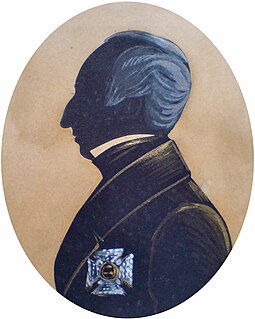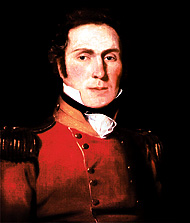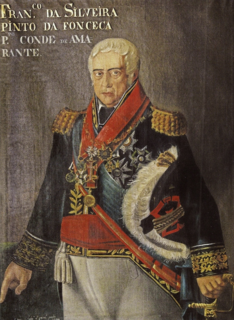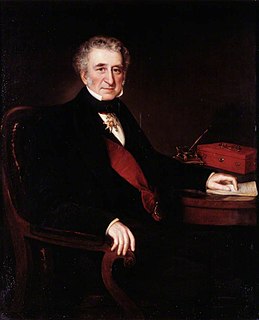 W
WGeneral William Carr Beresford, 1st Viscount Beresford, 1st Marquis of Campo Maior, was an Anglo-Irish soldier and politician. A general in the British Army and a Marshal in the Portuguese Army, he fought alongside The Duke of Wellington in the Peninsular War and held the office of Master-General of the Ordnance in 1828 in Wellington's first ministry.
 W
WVentura Blanco y Calvo de Encalada was a Chilean political figure.
 W
WJuan Palarea y Blanes, also known by his alias el Médico was a Spanish guerrillero commander during the Peninsular War, Medical Practitioner, and Spanish Politician.
 W
WJoseph-Napoléon Bonaparte, Comte de Survilliers, was a French lawyer and diplomat, the older brother of Napoleon Bonaparte, who made him King of Naples, and later King of Spain. After the fall of Napoleon, Joseph styled himself Comte de Survilliers.
 W
WThe Drummer of El Bruc is the name given to a popular Catalan legend derived from what happened during the Battle of El Bruc in the Peninsular War. According to the legend, the French defeat was due to a young boy who played the drums during the battle, the sound of which, echoing in the surrounding mountains, convinced the French troops that the number of their enemies was actually much larger than it really was. The name of the drummer is said to have been Isidre Lluçà i Casanoves (1791–1809), a peasant born in the nearby Santpedor.
 W
WLieutenant-General Sir John Cameron, KCB, of Culchenna, Inverness, Scotland, was a British Army officer and commander during the French Revolutionary Wars and the Napoleonic Wars.
 W
WCharles-Marie Denys, count de Damrémont was a French general and military governor of French Algeria. He was killed in combat during the siege of Constantine.
 W
WFrancisco Espoz Ilundáin, being better known as Francisco Espoz y Mina, was a Spanish guerrilla leader and general.
 W
WDom Miguel Pereira Forjaz Coutinho 10th Count of Feira, was a Portuguese general and War Secretary in the Peninsular War.
 W
WBernardim Freire de Andrade, was a Portuguese Army general officer who was assigned to command the forces of the Porto Junta in 1808 during the Peninsular War.
 W
WMaría Martina Ibaibarriaga Elorriaga was a Spanish guerrilla leader during the Peninsular War (1807–14). A legend later grew up that she pretended to be a man, enlisted in the Spanish army, and rose to the rank of lieutenant colonel.
 W
WJohn VI, nicknamed "the Clement", was King of the United Kingdom of Portugal, Brazil and the Algarves from 1816 to 1825. Although the United Kingdom of Portugal, over which he ruled, ceased to exist de facto beginning in 1822, he remained its monarch de jure between 1822 and 1825. After the recognition of the independence of Brazil under the Treaty of Rio de Janeiro of 1825, he continued as King of Portugal until his death in 1826. Under the same treaty, he also became titular Emperor of Brazil for life, while his son, Pedro I of Brazil, was both de facto and de jure the monarch of the newly independent country.
 W
WCarlos Frederico Lecor was a Portuguese general and politician. He was the first Baron of Laguna, in Portugal, and later ascended to Viscount of Laguna, in Brazil.
 W
WSir John Scott Lillie was a decorated officer of the British Army and Portuguese Army who fought in the Peninsular War (1808–1814). He was a landowner, entrepreneur and inventor. He was Deputy Lieutenant of the County of Middlesex and Chairman of the Middlesex Quarter Sessions, a freemason, a radical politician and supporter of the great Irish statesman Daniel O'Connell. He was an early antivivisectionist and writer.
 W
WCaptain Patrick Logan was the commandant of the Moreton Bay Penal Settlement from 1826 until his death in 1830 at the hands of Aboriginal Australians who objected to him entering their lands. As he had been hated by convicts, there were rumours that escaped convicts living in the bush had attacked him, but there is no evidence of this.
 W
WDom Manuel Pinto de Morais Bacelar 1st Count of Monte Alegre, was a Portuguese general.
 W
WDona Maria I was Queen of Portugal from 1777 until her death in 1816. Known as Maria the Pious in Portugal and Maria the Mad in Brazil, she was the first undisputed queen regnant of Portugal and the first monarch of Brazil. With Napoleon's European conquests, her court, then under the direction of her son João, the Prince Regent, moved to Brazil, then a Portuguese colony. Later on, Brazil would be elevated from the rank of a colony to that of a kingdom, with the consequential formation of the United Kingdom of Portugal, Brazil and the Algarves.
 W
WColonel Hugh Henry Mitchell, CB was a British military leader, of Irish birth, who fought in several decisive battles during the Napoleonic Wars, including the Battle of Salamanca and the Battle of Waterloo, and was commended by the Duke of Wellington.
 W
WJosé Rebolledo de Palafox y Melzi, 1st Duke of Saragossa was a Spanish general who fought in the Peninsular War.
 W
WCipriano de Palafox y Portocarrero, 8th Count of Montijo, 15th Duke of Peñaranda de Duero, 18th Count of Teba, GE, LH, was a Spanish nobleman, politician and soldier.
 W
WJosé Francisco de San Martín y Matorras, known simply as José de San Martín or El Libertador of Argentina, Chile and Peru, was an Argentine general and the prime leader of the southern and central parts of South America's successful struggle for independence from the Spanish Empire who served as the Protector of Peru. Born in Yapeyú, Corrientes, in modern-day Argentina, he left the Viceroyalty of the Río de la Plata at the early age of seven to study in Málaga, Spain.
 W
WFrancisco da Silveira Pinto da Fonseca Teixeira, was the 1st Count of Amarante, who joined the Portuguese army and fought in the War of Oranges and other campaigns of the Peninsular War, as an offshoot of the Napoleonic Wars.
 W
WGeneral Lord Robert Edward Henry Somerset was a British soldier who fought during the Peninsular War and the War of the Seventh Coalition.
 W
WJose Maria Torrijos y Uriarte, Count of Torrijos, a title granted posthumously by the Queen Governor, also known as General Torrijos, was a Spanish Liberal soldier. He fought in the Spanish War of Independence and after the restoration of absolutism by Ferdinand VII in 1814 he participated in the pronouncement of John Van Halen of 1817 that sought to restore the Constitution of 1812, for which he spent two years in prison until he was released after the triumph of the Riego uprising in 1820. He returned to fight the French when the Hundred Thousand Sons of Saint Louis invaded Spain to restore the absolute power of Ferdinand VII and when those triumphed ending the liberal triennium exiled to England. There he prepared a statement which he himself led, landing on the coast of Málaga from Gibraltar on December 2, 1831, with sixty men accompanying him, but they fell into the trap that had been laid before him by the absolutist authorities and were arrested. Nine days later, on December 11, Torrijos and 48 of his fellow survivors were shot without trial on the beach of San Andres de Málaga, a fact that was immortalized by a sonnet of José de Espronceda entitled To the death of Torrijos and his Companions, Enrique Gil y Carrasco's A la memoria del General Torrijos, and by a famous painting that was painted in 1888 by Antonio Gisbert. "The tragic outcome of his life explains what has happened to history, in all fairness, as a great symbol of the struggle against despotism and tyranny, with the traits of epic nobility and serenity typical of the romantic hero, eternalized in the famous painting by Antonio Gisbert." The city of Málaga erected a monument to Torrijos and his companions in the Plaza de la Merced, next to the birthplace of the painter Pablo Picasso. Under the monument to Torrijos in the middle of the square are the tombs of 48 of the 49 men shot; One of them, British, was buried in the English cemetery (Málaga).
 W
WDominique Honoré Antoine Vedel was a French general who participated in the French Revolution, the War of the Fourth Coalition and the Peninsular War.
 W
WGeneral John Alexander Dunlop Agnew Wallace, was a British Army officer.
 W
WJohn Fane, 11th Earl of Westmorland, styled Lord Burghersh until 1841, was a British soldier, politician, diplomat and musician.